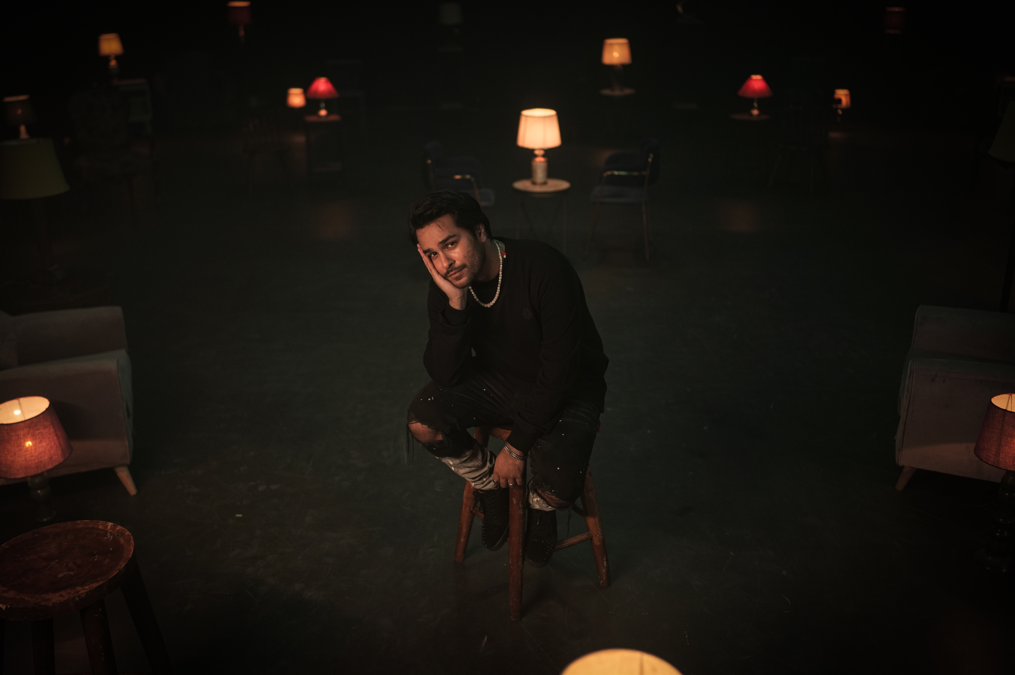
Asim Azhar has been serenading our hearts with his soulful melodies for over a decade now. His ability to weave intricate narratives into songs and his knack for crafting relatable, heartfelt numbers has earned him a huge following in Pakistan and beyond. Having started his musical journey at a tender age, he has grown to become a household name. And his latest offering, Chand Mahiya, is a testament to his artistic evolution.
The electropop track opens with a gentle tune as Asim croons softly to express his disdain. He scorns himself for falling so deeply in love with another while his singing reflects his vulnerability. Chand Mahiya isn’t a far cry from his previous outings, but it’s Asim at his sturdiest, branding himself as the undefeatable doyen of romance. The song is an interplay between drama and dogma. Its lyrics infused with questions are part reflective and part confrontational. Albeit simple, they’re not simplistic and cater to the dilemma of young people in love.
Music for the soul
Although Asim has spent a decade in the music industry with his fans having practically grown up with him – “some of them have kids now,” he tells me over a phone call – his music is fresh to the ears and catering to the newer generation. That is not to say it lacks maturity, but that it’s carefully distilled with only the most relevant emotions. Appealing a particular age-group is not on Asim’s checklist, though. “The reason why I'm so lightheaded about things now is because I'm making songs that I want to make. I'm not putting a criterion around my music and I accept that the margin of failure is more when you start doing that. But I believe in longevity, in self-happiness and self-satisfaction,” he shares with The Express Tribune.
Asim’s tunes have always been catchy while carrying a distinct melodic sensitivity. As a kid who started out on YouTube, covering contemporary Western music, Asim grew to perform on Coke Studio, sing anthems, OSTs and even ventured into playback singing. So much of his musical catalogue is decked by his contributions to various platforms. And while each of those may serve as career-defining moments for him, it’s rare to hear Asim sing for his soul. But it is magical when he does – Jo Tu Na Mila is his most-heard song for a reason.
Unlike Jo Tu Na Mila, though, his recent outings such as Chand Mahiya, Bulleya and Habibi, offer a more laidback approach, especially in terms of sound. Asim is shifting gears and the gradual but definite change in his music hints at his inclination towards a more indie way of life. “I'm a sucker for experimenting. I feel that when an artist runs out of creative fuel, that’s when experimentations and collaborations come into play. ‘Collaboration’ is a very important word,” he stresses. “And, you know, my new sound, that I've been releasing recently, I think it's not a drastic change. You'll never hear a drastic change for me. I always enjoy long visions and longevity. But obviously, I understand that the kind of audience that I cater to, it needs to be pushed out slowly, even the experiments, so it's not difficult for them to digest.”
Chand Mahiya in the making
Chand Mahiya is a product of Asim having put together his home studio. It is also a result of perhaps his new-found perspective on love. “I started working on this song when I set up my makeshift home studio. I would spend my nights trying to experiment and explore new sounds. And that's how I came about this particular beat. And once I kind of had a structure, a melodic and a musical structure, I started writing. But the writing part is very interesting,” he shares.
“It’s based on a character who's really enjoying his freedom. He travels a lot, does not believe in love, does not believe in anything spiritual, and just lives his days as they come. He doesn't really enjoy relationships with strings attached or responsibilities. But then there's this girl, who is the total opposite of his world, sweeps him off of his feet. And now he is complaining about losing his freedom. Love is a bittersweet feeling for him because at the back of his mind, somewhere, he always knew that there will a person who will come and you know, mess things up. And he loved his freedom, his uraan (flight) so now he laments ‘Chand mahiya, ye tune kya kiya (my darling, what have you done, you cut my wings)’.”
Asim primarily wanted to challenge himself with his latest expression of love. “When you’re falling for someone, it shouldn't always be like ‘Jabse maine tumko dekha mein pagal hogaya, you know? I tried to make it interesting. There's this part in my song where I say ‘Mein tou khogaya, mein tou khogaya, ye kese hogaya? Dil mera puche ye sawal we’. That’s where the character is wondering how he could let this happen. And the next stanza says ‘Tujhe dekhun mein sapnon mein, ghairon mein, apnon mein, har chehra tera he deedar hai’. He's helpless. He knows what comes with love; the beauty and the tragedy of love.”
Record deal with Universal Music
Asim maintains that the upcoming season will see the greatest number of releases from his end, not just because he’s signed a three-year record deal with Universal Music, but also because he’s got an EP in the pipeline. “We’re going to follow up with a new song and a music video every other month. And with that being said, I'm also working on my debut EP, which will have, you know, more than a few songs,” promises the singer.
About his record deal, Asim delves, “It was quite amazing to get linked and work with an international entity like Universal. The best part about our relationship is that it’s all about music; the quality and quantity, given that consistency is key for relevancy. So, we're going to be releasing songs every other month. We're going to be releasing a music video every other month. That's something I hadn't experienced as an independent artist because you can only do so much.”
Labels in Pakistan
On that note, when asked about the limitations he has faced over 10 years as an independent artist in Pakistan, provided that he started out at a time when digital hadn’t really picked up, Asim reflected, “I was doing as much as I could but obviously there’s a threshold when you're self-producing, self-investing and creating. But I had to come to terms with the kind of environment that we had. I had to come to terms with there not being such outlets for music. Not speaking about others, I did the best I could in my capacity which is why I'm here. But definitely there is no denying that if we had structured companies/labels for music, things would’ve been easier. When I started out, we were dependent on TV, channels, and we could not rely on digital then. So, I have seen those times and I thank God that I understood there and then that nobody will come and save me.”
But Asim isn’t the only one who’s bagged a record deal with an international label lately. From the looks of Shae Gill’s recent Coke Studio Global outings, Universal Music seems to also have signed her up. And rumour has it that Taha G has signed a deal with Sony. So, what’s suddenly pushing these labels to Pakistani artists, I ask. “Ever since Covid hit, somehow the Pakistani independent music scene has really hit it off. There’s been a lot more freedom for independent artists because of companies like Spotify. It's just been much less complicated for songs or art, to, you know, transfer through borders, cultures and just around the world.”
“I think that is why companies like Universal and other big names may be investing here. Pakistani pop music has always brought its A-game, not from now, not from before – always. And the world knows that. So, it's not like they're cashing in on something. It's just that they also realize that Pakistani art deserves better. And I think they just want to play their part in bringing Pakistani art to the world.”
Rounding up a decade
About what he’s learnt from his 10 years in the industry, Asim shares, “I think spending 10 years here has taught me more about life than about the business. And I think that helps me curate the business side of it as well. Creatively, I've kind of let loose. But I've learned so much about people, about humans in general. You know, it's nothing less than a PhD for me.”
As for the most challenging song that he’s ever had to do, the singer revealed, “The most challenging song that I've worked on was an OST for a project called Sinf-e-Aahan. I'm always so proud to be a part of a project like that. It was about six to seven girls, their journey from getting stereotyped to eventually doing something extraordinary. That OST took me seven months to complete.” Asim recalled being as invested in the serial in order to make the OST as any actor on the show. “A lot of preparation went into it. I was as involved in the script as the rest of the cast and crew was. I had to study the script. I had to know every it's in bits of the characters. In desi songs, the antra, which is the second verse of the song, it’s different than the first, it’s like the breakdown and it's usually longer. I had to write six different antras – that means I had to write six to seven different stanzas on each of the girl’s stories”
But his favourite from his catalogue is always his most recent song. “My favourite is Chand Mahiya. It’s always my latest song. I think it’s a musician thing.”
Have something to add to the story? Share it in the comments below.

1731550446-0/Polymarket-(1)1731550446-0-165x106.webp)

1729512368-0/liam-(8)1729512368-0-165x106.webp)
-(1)1718038311-0/SYDNEY-(1)-(1)1718038311-0-165x106.webp)
1719921789-0/dua-lipa-(1)1719921789-0-270x192.webp)











COMMENTS
Comments are moderated and generally will be posted if they are on-topic and not abusive.
For more information, please see our Comments FAQ